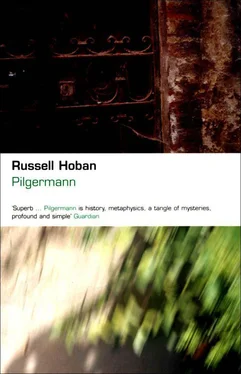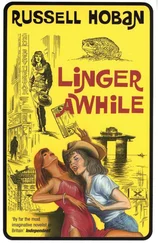Russell Hoban - Pilgermann
Здесь есть возможность читать онлайн «Russell Hoban - Pilgermann» весь текст электронной книги совершенно бесплатно (целиком полную версию без сокращений). В некоторых случаях можно слушать аудио, скачать через торрент в формате fb2 и присутствует краткое содержание. Год выпуска: 2002, Издательство: Bloomsbury Publishing PLC, Жанр: Современная проза, на английском языке. Описание произведения, (предисловие) а так же отзывы посетителей доступны на портале библиотеки ЛибКат.
- Название:Pilgermann
- Автор:
- Издательство:Bloomsbury Publishing PLC
- Жанр:
- Год:2002
- ISBN:нет данных
- Рейтинг книги:5 / 5. Голосов: 1
-
Избранное:Добавить в избранное
- Отзывы:
-
Ваша оценка:
- 100
- 1
- 2
- 3
- 4
- 5
Pilgermann: краткое содержание, описание и аннотация
Предлагаем к чтению аннотацию, описание, краткое содержание или предисловие (зависит от того, что написал сам автор книги «Pilgermann»). Если вы не нашли необходимую информацию о книге — напишите в комментариях, мы постараемся отыскать её.
Pilgermann — читать онлайн бесплатно полную книгу (весь текст) целиком
Ниже представлен текст книги, разбитый по страницам. Система сохранения места последней прочитанной страницы, позволяет с удобством читать онлайн бесплатно книгу «Pilgermann», без необходимости каждый раз заново искать на чём Вы остановились. Поставьте закладку, и сможете в любой момент перейти на страницу, на которой закончили чтение.
Интервал:
Закладка:
What chance has Judas? He eats the bread of Christ as would a dog given a crust by his master, and with the bread comes Satan. There sits Christ, stolid and stocky in the Naumburg stone, solid as the stone itself. There is no fault to be found in him, he will betray no one. Ay! Judas, Adam and Eve, the Jews — what was to be expected of them? What did God as He, God as Logos, God as Christ, want of any or all of them? How were Adam and Eve to resist the fruit that God had created irresistible? How were the Jews to be other than imperfect and deviant from the will of that same God who created them imperfect and deviant from his will? How were they not to make a golden calf in the shadow of that holy, that terrifying and untouchable mountain of the Law? How was Judas not to betray Jesus after Satan had entered him in that double eucharist? Jesus was the one who could withstand Satan, he was the strong one; he required of Judas that betrayal that Judas, powerless to do otherwise, already a dead man and Satan-entered; enacted as his necessary part of the story.
What are we but creatures of the God who made us as we are? Either God is omnipotent, omniscient, and omnipresent or he isn’t. If he isn’t then he must take his chance with the rest of us and not demand special treatment; if he is all-powerful, all-knowing, and everywhere-present then he has nothing to complain of except that the universe would come to a halt without the dynamic asymmetry of Adam and Eve’s original sin, of the Jews’ whoring after false gods, of Judas’s betrayal of Jesus, of Pilgermann’s adultery and every other act of wrongdoing since the human race first took upon itself the task of maintaining universal spin and motion according to the will of God. Try to conceive of things as other than they are — it can’t be done. While humankind exists there can only be the rotation of God’s impossible requirements and humankind’s repeated failures. Indeed, what is God but an impossible requirement? Any possible requirement would not be God.
So. Stone Judas, fed by his stone master, eats his stone bread while dipping his hand into the stone meats of the last supper. The stone, friend and brother to Christ and stonecarver and all of us alike, remembers this because the iron has told it to remember and it obeys.
In the next scene of the Naumburg stone story Judas gets his thirty pieces of silver from the high priest. Here we see the full power of that stone memory, that stone retention. This stone knows what it knows: Judas, his face that of a stunned brute, is not his own master, and this is not forgotten by the stone. But if Judas is thus sold even as he sells Jesus, what of this high priest through whose listless fingers slide the clinking silver coins into the fold of the cloak Judas holds out to catch them. Is this Caiaphas? It must be he. And what is in his face, this face that seems of all of them to be the most thoughtfully observed? Does Caiaphas choose to be Caiaphas? Why does he look out at us like this from the stone? Such a tired face. There is left to me only this!’ says that face.
Why? Why only this? What words of Caiaphas does John give us, what has Caiaphas to say of Jesus? ‘If we leave him thus, all men will believe in him, and will come the Romans and will take away both the place and the nation.’ What else does Caiaphas say to the council of the chief priests and the Pharisees? ‘Ye know not anything, nor reckon that it is expedient for us that one man should die for the people and not all the nation perish.’ And this, John tells us, Caiaphas ‘from himself he said not, but being high priest of that year he prophesied that Jesus was about to die for the nation, and not for the nation only, but that the children of God having been scattered he might gather into one From that day therefore they took counsel that they might kill him.’
So. Judas is entered by Satan, Caiaphas is doomed by reason and prophecy. How much freedom of choice has Caiaphas? He, like the rest of us, is free within the limits of his understanding. As I have said before, a story is what remains when you leave out most of the action. Vulgar tradition, like a painter who does not know how to render shadows, has filled in the sparseness of the Gospels with a sugary muck that makes the empty spaces dark and sticky. In the coloured picture cards in which Jesus now lives he and his twelve disciples move softly in their marzipan robes but the Jesus I saw was not a soft mover, and Caiaphas’s concern indicates that Jesus’s following was such as could well have moved Rome to take away both place and nation from the Jews.
Thus Caiaphas, acting for the good of his people, ensures their everlasting infamy. God as He, God as It has done this, has shown in this the never-to-be-understood mystery of his action in which Judas must betray Jesus and Caiaphas his people. All we can know is that there must be betrayal. Is not life betrayed by death? Is not up betrayed by down? Is not space-time betrayed by that recurrent contraction to the singularity from which it must burst anew? The Jesusness of Jesus cannot live without the Judasness of Judas, the Caiaphasness of Caiaphas, the Pilateness of Pilate. Ponderous wheel!
In the next scene Judas kisses Jesus while Peter with a sword cuts off the ear of the high priest’s servant. Christ stares out in perpetual innocence from the stone while the guilty betrayer, submissive to the forces moving him, presses close like a dog to his master. In the Gospel of Matthew Jesus says to Judas, ‘Comrade, do that on what thou art here.’ In Mark he says nothing. In Luke he says, ‘Judas, with a kiss the Son of man betrayest thou?’ In John again he says nothing. There it is: the Gospels say what they say and the stone remembers what it is told. Very good. Who is this Pilgermann, this drifting wave-and-particle vestige of a castrated Jew, who is this Pilgermann to have an opinion on the matter? From where I am now I see the universe isotropically receding in all directions. I am, equally with all other waves and particles, its centre. From that centre I speak as I find, and I find that I have questions for which neither the Gospels nor the Holy Scriptures offer answers. Theologians and fathers of the Church cannot confound me, they have no firmer ground on which to stand than I. So. Here is Christ, the one who makes the blind see, makes the crippled walk; here is Christ, the one who raises the dead, walks on the water, feeds the thousands with his loaves and fishes. Christ the Word made flesh, Christ the Son of God. And what says he to this mortal lump, this uncorrected sinner, this strayed sheep and Satan-entered? What says Christ, the Good Shepherd? ‘Judas, with a kiss the Son of man betrayest thou? Comrade, do that on what thou art here.’ Because Christ will have, must have his betrayal. ‘Comrade, do that on what thou art here.’ Do it that the cosmos may uncoil its onward energy, that the wheel may go on turning: night and day, plus and minus, eden and gehinnom, matter and anti-matter, Jesus and Judas.
Now I wonder, yes I wonder, on whom is it to forgive whom? Who is the sacrifice, the one for the many, the ransom, the redeemer? Who is to represent us all? Is it Jesus the betrayed, the crucified, or is it Judas the betrayer and his own hangman? Or is it the binary entity of Jesus/Judas alternating and inseparable? How the thunder rolls when certain words are put together! When certain mysteries are named! Not to be understood, not to be attempted even! Roll, thou eden and gehinnom of the rolling universe! Hurry on, thou road to Jerusalem, thou road returning! A rushing and a plodding, a palimpsest of footsteps rising from the ground under my feet up into the air high over my head so that I feel myself to be drowning in the going and the ghosts of going of those footsteps, footsteps upon footsteps and ghosts upon ghosts, a madness of going that moves both ways on this road. This road is the treadmill on which we walk day into night and night into day, eden into gehinnom into eden, Jesus into Judas into Jesus.
Читать дальшеИнтервал:
Закладка:
Похожие книги на «Pilgermann»
Представляем Вашему вниманию похожие книги на «Pilgermann» списком для выбора. Мы отобрали схожую по названию и смыслу литературу в надежде предоставить читателям больше вариантов отыскать новые, интересные, ещё непрочитанные произведения.
Обсуждение, отзывы о книге «Pilgermann» и просто собственные мнения читателей. Оставьте ваши комментарии, напишите, что Вы думаете о произведении, его смысле или главных героях. Укажите что конкретно понравилось, а что нет, и почему Вы так считаете.












